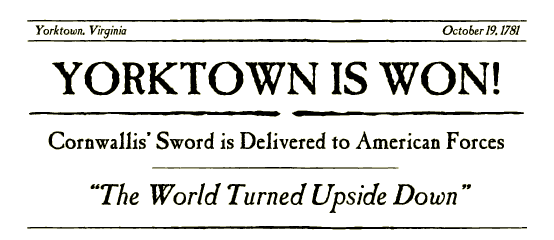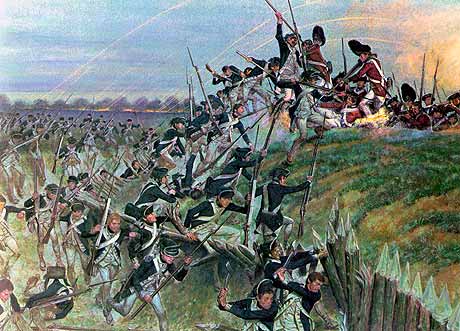What is considered the most important battle of the Revolutionary War?
 September 28, 1781 — About 9,000 American forces and 7,000 French forces begin the Battle of Yorktown against British Gen. Lord Charles Cornwallis and a contingent of 9,000 British troops.
September 28, 1781 — About 9,000 American forces and 7,000 French forces begin the Battle of Yorktown against British Gen. Lord Charles Cornwallis and a contingent of 9,000 British troops.
Historians consider this the most important battle of the Revolutionary War.
Washington ordered Marquis de Lafayette and an American army of 5,000 troops to block Cornwallis’ escape from Yorktown by land while the French naval fleet blocked the British escape by sea. Today, he encircled Cornwallis and Yorktown with the combined forces of Continental and French troops. After three weeks of nonstop bombardment, both day and night, from cannon and artillery, Cornwallis surrendered to Washington in the field at Yorktown on October 17, 1781, effectively ending the War for Independence.
By the end of the battle, 60 French were killed and 194 wounded; of the Americans, 28 were killed and 107 wounded, totaling 88 killed and 301 wounded.
Cornwallis surrendered 7,087 officers and enlisted men in Yorktown when he capitulated and a further 840 sailors from the British fleet in the York River. Pleading illness, he did not attend the formal surrender ceremony, held on October 19. Instead, his second in command, General Charles O’Hara, carried Cornwallis’ sword to the American and French commanders.
Peace negotiations began in 1782, and on September 3, 1783, the Treaty of Paris was signed, formally recognizing the United States as a free and independent nation after eight years of war.
Sources
Words of Wisdom
The name of American, which belongs to you, in your national capacity, must always exalt the just pride of Patriotism.... It should be the highest ambition of every American to extend his views beyond himself, and to bear in mind that his conduct will not only affect himself, his country, and his immediate posterity; but that its influence may be co-extensive with the world, and stamp political happiness or misery on ages yet unborn.




